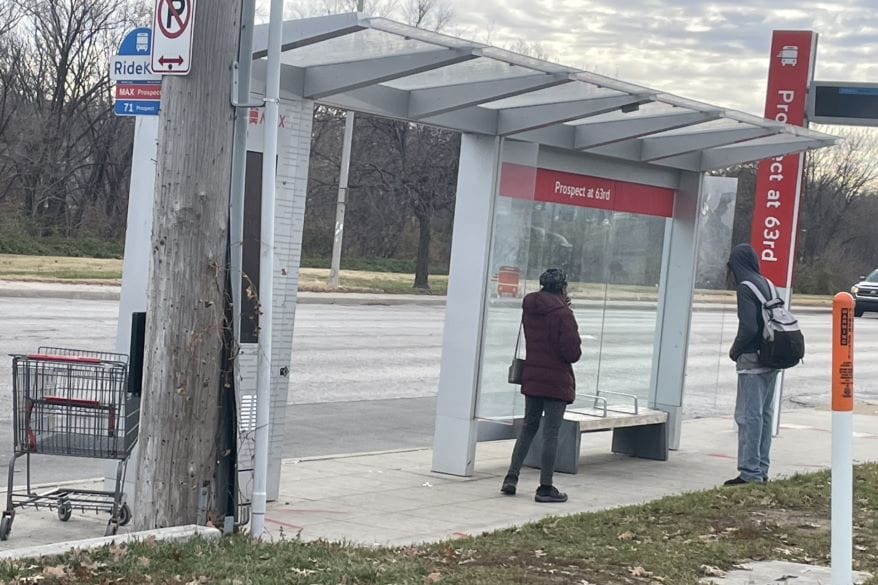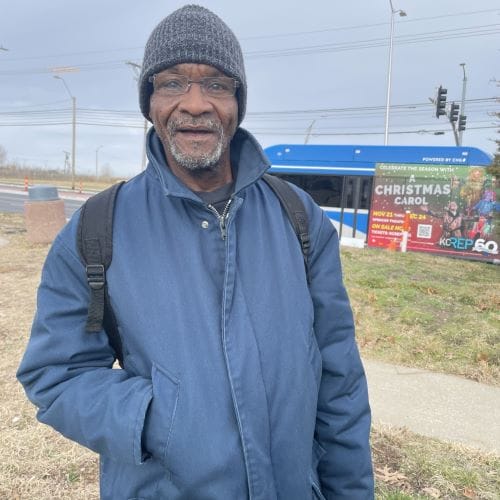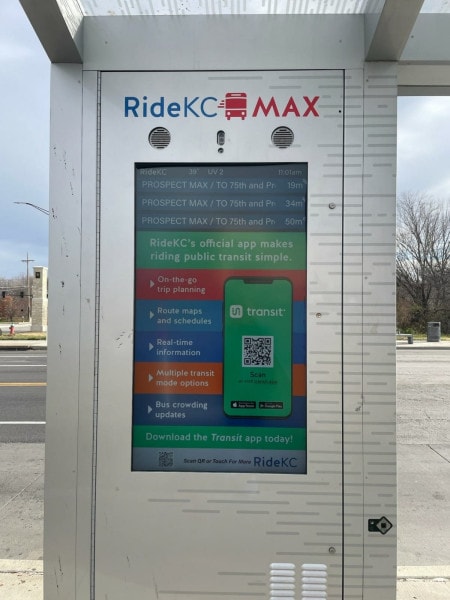Kansas City Ponders Impact of Free Bus Service Federally Funded Study Believed to be Nation’s First
Published December 14th, 2023 at 6:00 AM
Above image credit: Kansas City buses pick up and drop off passengers about every ten minutes at this stop on Charlotte Street, in the middle of the complex that is University Health, formerly known as Truman Medical Center. (Mary Sanchez | Flatland)In 2020, Kansas City drew national acclaim by ditching fares, making city buses free to ride.
Accolades quickly followed for the forward-thinking move.
Advocates consider free buses an equity issue, allowing people greater access to jobs, schools and health care in a far-flung city. Kansas City was the first large U.S. city to eliminate fares.
The change came just as COVID-19 arrived, which initially cut into bus ridership.
Each subsequent year, the amount of foregone bus fare revenue was largely replaced by city funds.
Critics also predicted that the buses would attract houseless people and an increase of bad behavior.
Finally, new leadership took the helm of the Kansas City Area Transportation Authority (KCATA) replacing the man who had passionately advocated and made the switch to zero fare.
All of this has culminated in questions on the sustainability of the free bus system.
The next meeting of the KCATA’s board of commissioners is Dec. 20. The agenda, including any discussion on the free fares, has not yet been published.
But for many advocates, the need for accessible transportation options is clear.
The sprawling layout of the Kansas City area, with a plethora of highways, almost demands that people have a car. Or they miss out.
“For the most part, if you don’t have a car, you have trouble accessing education, employment, health care,” said Eric Rogers, executive director and co-founder of BikeWalkKC. “And really, you need a car to participate in civic life, in social life and to find economic opportunities.”
‘Valuable’ Research
Zero fare is just part of expanding transportation options for residents.
A team of researchers at the University of Missouri-Kansas City (UMKC) now is studying if keeping city buses free is sustainable and the related impacts. More than $3 million in federal grants support the project.
The research, expected to be completed in three years, is believed to be the largest U.S. study of zero fare.
The UMKC team will assess the health impact on riders, through a collaboration with University Health, formerly Truman Medical Center. Researchers will gauge the attitudes of voters and elected officials across the metro, measuring appetites for continuing to offer free fares and eventually expanding it into a cohesive, metropolitan transit system.
Other cities that are considering free buses are seeking evidence of improved health outcomes, which is needed to judge if the benefits outweigh any costs, said Amanda Grimes, part of the research team and an associate professor of health sciences at UMKC.
“Whatever happens in Kansas City, this data and research can be used in other cities nationwide,” Grimes said. “So it’s valuable.”
The research team has offered to meet with the KCATA early in 2024 to present their preliminary results, said UMKC Assistant Professor Joseph Lightner, who is serving as program director.
The KCATA is governed by a 10-member board, with five from each side of the state line. The KCATA did not respond to Flatland for this story.

Area residents have received the research team’s offer to provide input in a survey. Residents can reply either by filling out the 27 questions and submitting it through a pre-paid envelope, or online through a QR code.
The mailers, from the UMKC School of Nursing and Health Studies, were recently sent to registered voters.
The questions dive into how people get around the city: walking, biking, driving alone, as a passenger in a vehicle, taxi or rideshare or by city bus.
Among other questions, the survey seeks to gauge feelings of safety during transportation, fears of being in an accident or if someone values privacy as they travel.
One question presses people to assess the impact of free buses. Prompts ask about beliefs in whether it improves the environment, reduces climate change, reduces the number of cars on the road, or if free fare reduces structural racism.
The research is funded by the U.S. Environmental Protection Agency ($200,000), the National Institutes of Health ($2.5 million) and the U.S. Department of Transportation ($500,000).
A regionally funded transit system is the “ultimate conversation” that the metropolitan area needs to eventually reach, Rogers said.
“So that we don’t have this patchwork of every city kind of funding their own little bit,” Rogers said. “We really need any evidence around what the benefits would be if we had better transit service.”
Can Riding the Bus Impact Health?
People who rely on the bus tend to have health disparities compared to residents with more means, with higher rates of illnesses like diabetes and obesity.
The theory is that zero fare can help reduce disparities, in part, by making it easier to get to medical appointments, healthier food options and even by walking more to reach a bus stop.
Willie Clark is a lifelong user of Kansas City’s buses. At 66, he appreciates how the free fare has helped ease his budget.
The $1.50 it cost him before 2020 added up, even with free transfers, or the use of a pass.

On Tuesday, he waited at 63rd Street and Prospect Avenue, chatting with other bus riders, thinking that he would catch a westward bus to reach a Social Security office. He planned to get some groceries before heading back to his home near 50th Street and Park Avenue.
Clark walks a lot but keeps an eye out for the bus to help complete errands, to reach his volunteer work at a bike shop on Troost, or to reach his part-time job doing maintenance at a Brookside church.
Sometimes, even if a bus is coming, he’ll keep walking if he’s close to his destination.
Free fares have increased the numbers of houseless people riding buses, Clark said, along with some behavioral issues, such as riders boarding drunk and arguing, often with the bus driver.
“But if you spit on the driver, they’ll charge you and make you get off,” Clark said. “I realize that it’s stressful for the drivers, but they don’t tolerate it.”
Some of the work that the research team will do is in collaboration with University Health.
By linking with University Health, the researchers have access to the health markers of 1,500 patients before zero fare was implemented, going back to 2018.
By surveys and tracking, they hope to determine if zero fare has helped improve health outcomes of those who are bus riders.
“It’s really this population of community members that we think have the most potential to benefit from policies like zero fare,” Lightener said.
Professor Grimes said that focus groups have drawn many positive anecdotes from bus riders when they are asked about the free fare.
“The answer is like 100 percent it has changed my life,” Grimes said.
People tell stories about being able to finish school or maintain their employment even after a car broke down, or tell about taking their children with them to the store instead of leaving them behind because they needed to pay for multiple bus passes for every member of the family.
Free Buses as a Social Equalizer
Credit for pushing to eliminate bus fares points back to Robbie Makinen, a former president and chief executive of the KCATA.
In July 2022, Makinen was reportedly forced out under pressure from city officials after he disagreed with using federal pandemic relief funds for the KCATA for an LED streetlight project.
Frank White III replaced Makinen.
Makinen, in previous interviews, highlighted the equity impact of zero fare, noting that the disabled and people with lower incomes often are bus riders.

The $1.50 that people save on their fares is generally redistributed into the community when they buy food, or perhaps buy prescriptions and other necessities, Makinen argued.
“Whenever you say free transit, everyone goes crazy and says it’s not free — someone’s paying,” Makinen told the American Planning Association in a 2021 article for the organization’s magazine. “But the return on investment for empathy, compassion, for social equity, far outweighs the return on investment for concrete and asphalt. Let’s invest in people, in our workforce.”
In past years, fares generated between 7% and 12% of the KCATA’s budget, or about $9 million in 2019, according to reporting by KCUR.
Other KCATA services, such as the small blue RideKC Freedom vans and IRIS, still collect fees.
Initially, the decision to eliminate bus fares came with the promise from Kansas City to help cover the costs. The City Council voted in 2019 on the measure, agreeing to provide funds through the city’s half-cent sales tax to support public transit.
How those extra costs can be covered going forward is among the questions that remain unanswered, balanced by whatever proof the researchers can document on benefits to the community.
In research the team has already completed, about 65% of community members surveyed reported that zero fare had a positive impact on their employment or income, noted Jordan Carlson, an associate professor and director of Community-Engaged Health Research with Children’s Mercy Kansas City.
A handful of other cities — including Albuquerque, New Mexico; Raleigh, North Carolina; Tucson, Arizona; New Haven, Connecticut; and Richmond, Virginia — have instituted zero fare. But interest by other city planners and transportation experts is increasing, he said.
“There’s a momentum of growing interest,” Carlson said. “But Kansas City, I believe, gets credit for pioneering this in the U.S.”
Mary Sanchez is senior reporter for Kansas City PBS.


